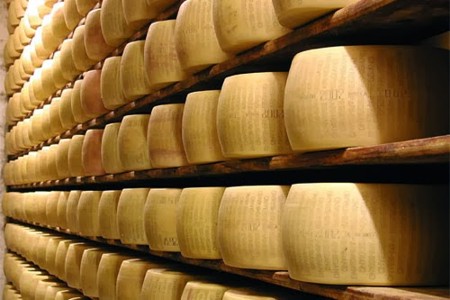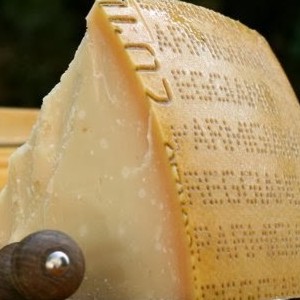Fair warning: The European Union is about to do, with its famous cheeses, what It’s already done with its Wines and Olive Oil. There’s a move afoot to institute international restrictions on what can legally be labelled ‘Parmesan’, ‘Gruyere’ and even ‘Feta’. But does it really matter?
 Real Parmigiano Reggiano. Hundreds of thousands of wheels like these
Real Parmigiano Reggiano. Hundreds of thousands of wheels like these
rest in caves beneath Parma, Italy, while the Italians try to sell them…
I just about fell off my chair when I read the story in the paper recently. But probably not for the reasons you’re thinking. Anyway…
The European Union pulled the idea out of its hat during trade negotiations with the U.S. Under the scheme, cheeses made in the U.S. in the style of those famous European counterparts may soon have to be clearly labeled as copies – knockoffs, if you will – of the ‘real thing’.
The EU says the American cheeses are a mere shadow of their real-deal European namesakes and that hurts both the sales and reputation of European cheeses. And that’s no small thing: The U.S. cheese market is worth more than $4 billion a year! No wonder the Europeans want a bigger wedge of that wheel!
The nuts and bolts…
Under a recent agreement between the EU and Canada, which may become the basis of a similar agreement with the U.S., use of certain European cheese names is restricted – unless the cheese actually comes from Europe. Take Feta. Even though this ubiquitous Greek cheese is made everywhere in that country and similar cheeses are made all round the Mediterranean, the Canadian agreement states that domestic ‘Feta’, for example, must be labelled ‘Feta-like’, or ‘Feta-style’, or something similar, and makers can’t use Greek letters or symbols that ‘evoke’ Greece on their labels. I guess that’s fair. And, if the experience with European wines is any indicator, we shouldn’t see any great increase in purchases of imported cheeses. Folks will pretty quickly get over the labeling thing and carry on as before. Money talks.
The nitty-gritty…
But here’s what threw me for a loop. The AP story I read poses the titular question: “Would Parmesan by any other name be as tasty atop your pasta?”
I say, sure it would. Very few restaurants in North America (the top-end signature Italian restos aside) use real imported Parmesan or Romano. Too expensive. They already use the less-costly domestic products. They’ll keep on doing so. And 999 out of 1,000 diners wouldn’t know anything was going on. So what’s to moan and complain about?
Mangiare miei amici!
~ Maggie J.

